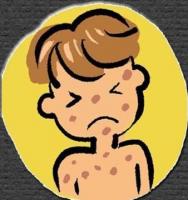Travel alert issued on European measles outbreaks
 CNS): The Public Health Department has issued an alert to travellers to and from Europe as a result of a measles outbreak across the continent. The measles outbreak has been reported in Denmark, Germany, the Netherlands, Norway, Serbia, Switzerland, Serbia Bulgaria and Turkey. Officials said there was no need to be alarmed anyone returning from Europe is asked to see a doctor immediately if they feel unwell. There have been no measles cases in the Cayman Islands since 1990 and local immunization coverage against the that and mumps is around 90% among 15 months old and about 97 percent by the time they reach school entry age.
CNS): The Public Health Department has issued an alert to travellers to and from Europe as a result of a measles outbreak across the continent. The measles outbreak has been reported in Denmark, Germany, the Netherlands, Norway, Serbia, Switzerland, Serbia Bulgaria and Turkey. Officials said there was no need to be alarmed anyone returning from Europe is asked to see a doctor immediately if they feel unwell. There have been no measles cases in the Cayman Islands since 1990 and local immunization coverage against the that and mumps is around 90% among 15 months old and about 97 percent by the time they reach school entry age.
“Although there is no need to bealarmed at this stage, we ask that anyone returning from Europe experiencing a sudden high fever accompanied by a rash to seek medical attention immediately. They should also give their travel history to the attending physician for necessary investigation,” said Medical Officer of Health Dr. Kiran Kumar.
British health officials also continue to see cases of measles this year, with 53 cases confirmed in England and Wales. Several of these have been traced back to people travelling to mainland Europe. Outside of the continent, India has also reported a measles outbreak.
“If you are travelling to any of the affected European countries, safeguard yourself and your family by ensuring that you and your children’s immunizations against measles are up-to-date,” advised Dr. Kumar. "Unprotected children are at the greatest risk of contracting this virus, should a case be imported. It is the duty of parents and guardians to ensure that their children are protected."
The Public Health Department has advised healthcare workers in the private and public sectors of the PAHO alert and will continue to monitor the situation.
Endemic measles has been eliminated in the Americas, with the last case reported in 2002. The Caribbean itself, this year celebrated its twentieth year without an indigenous case of the measles. Measles is however, still common in many developing countries particularly in Africa and Asia and people visiting these regions should pay attention to possible symptoms.
“Regionally, while there has been great progress, once again I emphasise that measles can be reintroduced as we have many residents and visitors travelling to and from the affected areas and we should therefore remain vigilant,” Dr. Kumar noted.
Measles is caused by a virus which normally grows in the cells that line the back of the throat and lungs. Measles is a human disease and is not known to occur in animals.
The first sign of measles is usually a high fever which begins about 10 to 12 days after exposure to the virus from a measles case. A runny nose, cough along with red and watery eyes and small white spots inside the cheeks can develop in the initial stage followed by a rash on the face and upper neck eventually reaching the hands and feet.
Close contact with other people for seven days following onset of rash must be avoided.
Anyone returning from the region with a presentation of symptoms is urged to contact the Public Health Department on 244-2648 or 244-2621, or Faith Hospital on 948-2243.
Category: Health


Strange… No measles cases in cayman since 1990. Yet my brother had measles in 1997.
It is like the looting after Ivan. Never happened, in a "it did happen sort of way". It is not a lie. No, technically it is a "scheme" or a "plan".